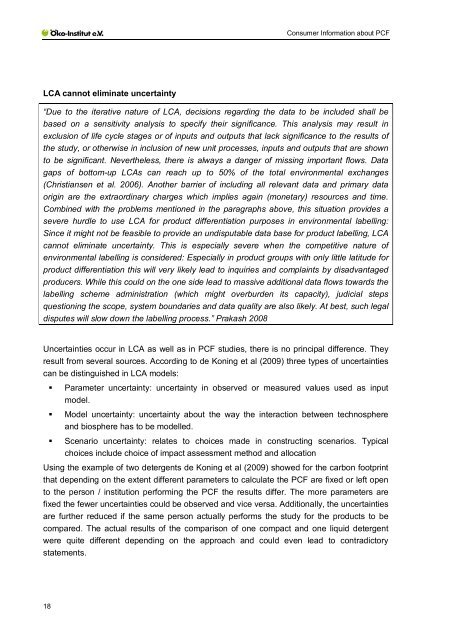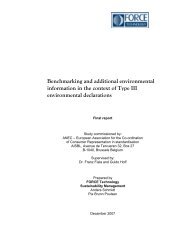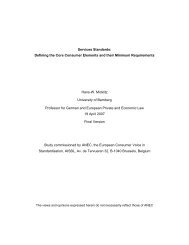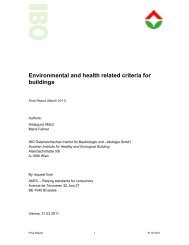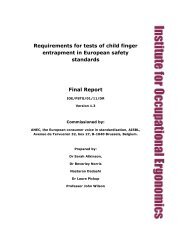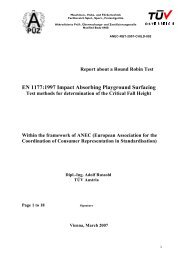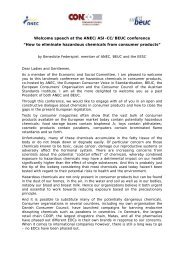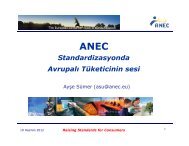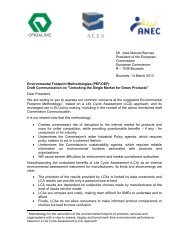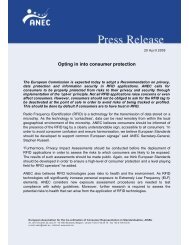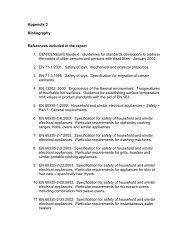Requirements on Consumer Information about Product ... - ANEC
Requirements on Consumer Information about Product ... - ANEC
Requirements on Consumer Information about Product ... - ANEC
You also want an ePaper? Increase the reach of your titles
YUMPU automatically turns print PDFs into web optimized ePapers that Google loves.
C<strong>on</strong>sumer Informati<strong>on</strong> <strong>about</strong> PCF<br />
LCA cannot eliminate uncertainty<br />
“Due to the iterative nature of LCA, decisi<strong>on</strong>s regarding the data to be included shall be<br />
based <strong>on</strong> a sensitivity analysis to specify their significance. This analysis may result in<br />
exclusi<strong>on</strong> of life cycle stages or of inputs and outputs that lack significance to the results of<br />
the study, or otherwise in inclusi<strong>on</strong> of new unit processes, inputs and outputs that are shown<br />
to be significant. Nevertheless, there is always a danger of missing important flows. Data<br />
gaps of bottom-up LCAs can reach up to 50% of the total envir<strong>on</strong>mental exchanges<br />
(Christiansen et al. 2006). Another barrier of including all relevant data and primary data<br />
origin are the extraordinary charges which implies again (m<strong>on</strong>etary) resources and time.<br />
Combined with the problems menti<strong>on</strong>ed in the paragraphs above, this situati<strong>on</strong> provides a<br />
severe hurdle to use LCA for product differentiati<strong>on</strong> purposes in envir<strong>on</strong>mental labelling:<br />
Since it might not be feasible to provide an undisputable data base for product labelling, LCA<br />
cannot eliminate uncertainty. This is especially severe when the competitive nature of<br />
envir<strong>on</strong>mental labelling is c<strong>on</strong>sidered: Especially in product groups with <strong>on</strong>ly little latitude for<br />
product differentiati<strong>on</strong> this will very likely lead to inquiries and complaints by disadvantaged<br />
producers. While this could <strong>on</strong> the <strong>on</strong>e side lead to massive additi<strong>on</strong>al data flows towards the<br />
labelling scheme administrati<strong>on</strong> (which might overburden its capacity), judicial steps<br />
questi<strong>on</strong>ing the scope, system boundaries and data quality are also likely. At best, such legal<br />
disputes will slow down the labelling process.” Prakash 2008<br />
Uncertainties occur in LCA as well as in PCF studies, there is no principal difference. They<br />
result from several sources. According to de K<strong>on</strong>ing et al (2009) three types of uncertainties<br />
can be distinguished in LCA models:<br />
• Parameter uncertainty: uncertainty in observed or measured values used as input<br />
model.<br />
• Model uncertainty: uncertainty <strong>about</strong> the way the interacti<strong>on</strong> between technosphere<br />
and biosphere has to be modelled.<br />
• Scenario uncertainty: relates to choices made in c<strong>on</strong>structing scenarios. Typical<br />
choices include choice of impact assessment method and allocati<strong>on</strong><br />
Using the example of two detergents de K<strong>on</strong>ing et al (2009) showed for the carb<strong>on</strong> footprint<br />
that depending <strong>on</strong> the extent different parameters to calculate the PCF are fixed or left open<br />
to the pers<strong>on</strong> / instituti<strong>on</strong> performing the PCF the results differ. The more parameters are<br />
fixed the fewer uncertainties could be observed and vice versa. Additi<strong>on</strong>ally, the uncertainties<br />
are further reduced if the same pers<strong>on</strong> actually performs the study for the products to be<br />
compared. The actual results of the comparis<strong>on</strong> of <strong>on</strong>e compact and <strong>on</strong>e liquid detergent<br />
were quite different depending <strong>on</strong> the approach and could even lead to c<strong>on</strong>tradictory<br />
statements.<br />
18


